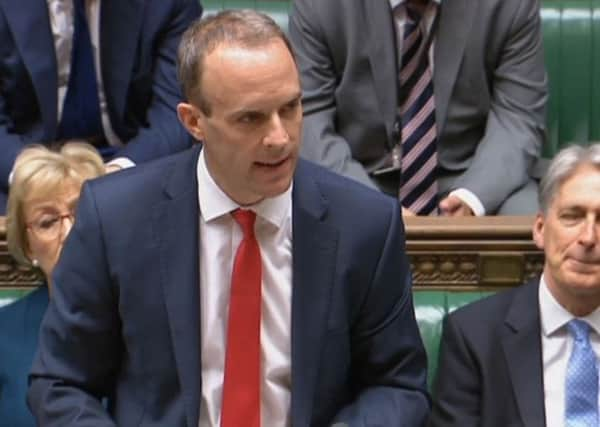The risk of a sudden Irish Sea border is rising as Brexit '˜no deal' nears


Mr Paterson is a member of ERG, which is a group of eurosceptic backbench Tory MPs including Jacob Rees-Mogg.
Mr Paterson was responding to an editorial in this newspaper, which endorsed the concerns of Robin Swann, the UUP leader, that the ERG paper did not rule out a regulatory border in the Irish Sea.
Advertisement
Hide AdAdvertisement
Hide AdThe British government has been increasingly emphatic that there will be no internal UK border. Indeed, the chancellor Philip Hammond told this newspaper over the summer that it was taking a while for Brussels to understand’s Britain’s adamance on that point.
His comments were heartening to unionist ears, given the disastrous backstop that Theresa May agreed in December.
The UK has vowed to have no infrastructure, not even CCTV, at the Irish land frontier. Is there any other nation on earth that has vowed not to police its border, let alone one as rich and powerful as the UK?
If anything has underlined perpetual British weakness and fear in the face of Irish nationalist anger, it was this daft pledge.
Advertisement
Hide AdAdvertisement
Hide AdThe latter apparent UK resolution on ruling out an Irish Sea border is a welcome, but partial, retreat from that idiocy. There was even a House of Commons amendment in July that seemingly made such a border illegal.
But the problem is: Dublin and the EU are not giving up on it, and they still talk about de-dramatising checks in the Irish Sea (note how Britain never even tried to counter this by talking about de-dramatising occasional, light imprint checks at the land border).
Yesterday, even the Conservative inclined journal The Spectator seemed to endorse the notion of de-dramatising some sort of Irish Sea border.
The danger is that EU inflexibility on the Irish border could yet bring about no deal, which London is desperate to avoid, as the lack of UK planning for no deal showed.
Advertisement
Hide AdAdvertisement
Hide AdNo matter how many times unionists get reassurances on this, they need to be fearful of what will happen if there is a frantic last minute bid to avoid no deal — and note the overwhelming parliamentary opposition to no deal.
This opposition is much more widespread at Westminster than is opposition to any concessions on Northern Ireland’s undiluted constitutional place in the UK (one reason people like me have warned unionists to seek to win friends in the House of Commons and to tread carefully when making demands for money and so on).
London has still seemed at times to be open to some sort of movement on this matter.
Earlier this month, Sammy Wilson MP on these pages (see link below) observed that the Brexit Secretary Dominic Raab had made clear in the House of Commons seven times that there would be no customs border in the Irish Sea, but had made no such pledge on a regulatory border.
Advertisement
Hide AdAdvertisement
Hide AdSuch a regulatory border relates to standards of goods as opposed to tariffs (ie the single market as opposed to the customs union).
Being in the single market with the rest of the EU would greatly alleviate (but not solve) the Irish land border question.
It is one of the reasons I am sympathetic to the Norway model, in which we stay in the single market but leave the customs union, and so (by leaving the latter) are able to do our own trade.
But from a unionist perspective that would have to be UK-wide.
Advertisement
Hide AdAdvertisement
Hide AdThe notion of Northern Ireland staying in the single market and the rest of the UK leaving sounds superficially attractive — best of both worlds etc. But it would put as at the behest of EU regulations indefinitely, which might diverge over time ever more from the UK.
Nationalism would never allow a return to UK standards, and soon demand NI had EU representation, and in the meantime Dublin would be our proxy representatives on those matters, so it would probably be the first stage to Irish unity.
This prospect of a regulatory Irish Sea border has not been fully ruled out — other than by the ERG, but their opposition is no surprise.
This whole episode is an illustration of the political rewards that can go to the people who shout the loudest.
Advertisement
Hide AdAdvertisement
Hide AdDublin has consistently been more organised and vocal on the question of no land border than unionists have been on the matter of no Irish Sea border — of any kind.
• Ben Lowry (@BenLowry2) is News Letter deputy editor
Advertisement
Hide AdAdvertisement
Hide Ad